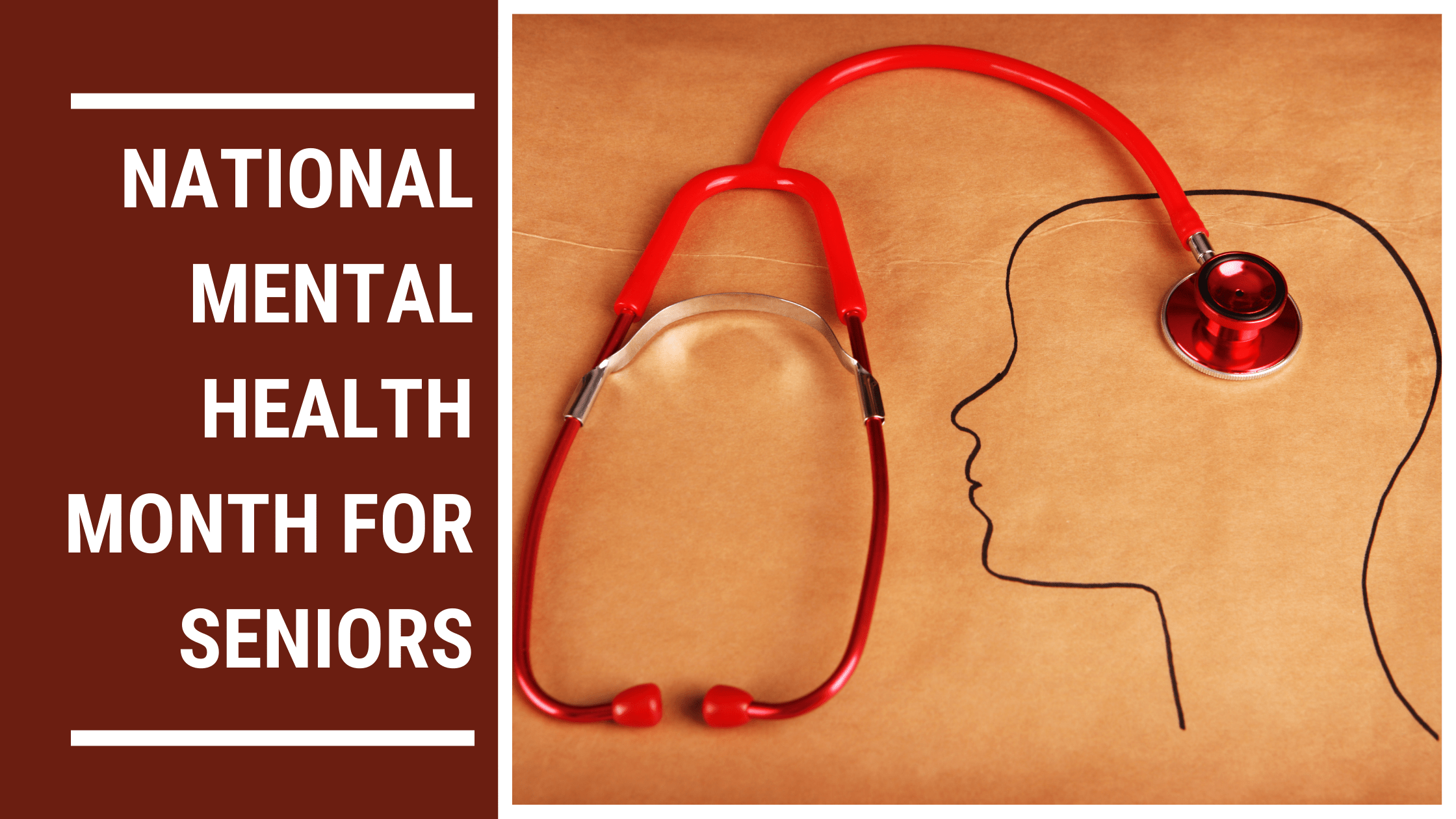
National Mental Health Month is a reminder that mental health plays a vital role in our overall wellbeing. Unfortunately, many older Americans don’t seek the help they need. So during this time, make a point to check in on your loved ones and understand their unique mental health needs.
Updated March 1, 2023
What Is National Mental Health Month?
In 1949, the nonprofit advocacy group Mental Health America created National Mental Health Week. By the 1960s, this weeklong observance extended through the whole month of May, and National Mental Health Month was officially established.
Throughout May, communities and groups across the country organize events to promote awareness about the importance of mental health and raise money to support various research and treatment initiatives.
Mental health is a severe problem for many Americans, particularly older adults. Sadly, a significant portion of the country’s aging population suffers from depression, anxiety, or suicidal thoughts. For this reason, meeting older adults’ needs calls for special attention and training from caregivers, family members, and mental health professionals.
The changes that aging brings can be challenging. However, learning more about healthy aging can help seniors live fuller, happier lives.
Recognizing Seniors' Unique Needs During National Mental Health Month
In 2012, research by the Institute of Medicine revealed that about one in five seniors struggles with mental illness, substance abuse, or a combination of the two.
In its 2017 survey, the Substance Abuse and Mental Health Services Administration (SAMHSA) found that 5.7 million seniors aged 65 and older reported binge drinking at least once a month, and 1.5 million admitted using illegal drugs.
- According to the CDC, over 7,000 elders died from opioid overdoses in 2016.
By 2030, an estimated 75 million Americans will be older than 65. Under those circumstances, if the figures shown by the Institute of Medicine’s research persist until 2030, the number of older adults facing mental illness or substance abuse will reach 15 million.
Consequently, as the number of older adults in the US grows, so will the need to address this population’s mental health challenges. A growing population of more older adults suffering from mental health and substance abuse disorders will likely devastate the country’s health and wellbeing. But on a personal level, the figures show that these problems will personally impact someone we know.
With this in mind, organizations like Mental Health America promote National Mental Health Month to raise awareness about evidence-based methods that support older adults’ unique mental health needs. In addition, advocates also strive to erase harmful myths that discourage people from seeking critical lifelines.
Eliminating Misconceptions About Aging And Mental Health
Older adults and families need to discuss these experiences because it helps everyone understand that these feelings are more than growing old. In addition, communication can help eradicate many misconceptions about aging and mental health.
Nearly 20% of seniors 65 and older face mental health issues, including depression, anxiety, or dementia. However, studies show that elders with symptoms of a mental health problem are less inclined to get help, whether from their doctor or mental health professional.
About 15.6 million adults 50 and older sought mental health services in 2017. Those who do look for help frequently report feeling more at ease discussing their mental health with their long-time physician rather than a therapist who is new to them.

Common Risk Factors To Seniors' Mental Health
While seniors encounter everyday forms of stress like everyone else, they can also experience stresses that occur more frequently with aging. These stressors can increase their chance of developing a mental illness or worsening an existing one.
Common risk factors include:
- Mobility loss
- Chronic pain
- Fragility
- Other health issues that necessitate long-term care
- Bereavement
- Reduced income
These can all culminate in isolation, loneliness, or as a form of psychological distress that may call for prolonged care.
Mental health and physical wellbeing correlate. Consequently, seniors must monitor both carefully to maintain their quality of life and longevity.
Elder abuse is another factor that can leave a lasting psychological impact. Recent studies found that one in six seniors suffer from elder abuse.
Abuse can be abandonment, physical, verbal, mental, financially manipulative, or sexual, but all of it diminishes the elder’s dignity and self-worth and severely impacts mental health.
Depression
Depression in the elderly can frequently go unnoticed or be mistaken for a side effect of a physical condition such as a stroke, heart surgery, or cancer.
Older adults may be reluctant to talk about depression if they previously considered it a sign of weakness. Alternatively, they may purposefully ignore the symptoms if their insurance doesn’t cover treatment for mental health.
Depression frequently accompanies other health concerns such as diabetes or heart disease.
Untreated depression, no matter how moderate, can weaken seniors’ immune systems and make it harder to recover.
Sometimes, many misconstrue the signs of depression as grief, especially for those experiencing loss or diagnosed with a terminal illness.
Signs of depression include:
- Persistent feelings of sadness, hopelessness, or anxiety
- Irritability
- Trouble focusing or remembering details
- Problems with appetite, such as overeating or losing interest in food
- Thoughts or attempts of suicide
- Sleep problems, consistent feelings of fatigue, or sleeping too much
- Headaches, body aches, digestive cramps
The side effects of some medications can imitate signs of depression, but some prescriptions could cause it.
Medicine for steroids, hormones, arthritis and high blood pressure can all cause depressive symptoms.
Since many elders take several medications, it can be easy for depression to go unnoticed or misdiagnosed.
Specialists usually prescribe antidepressants to treat this problem. However, they often have side effects like nausea, headaches, and restlessness.
Alternatively, psychotherapy is a relatively new treatment that discusses how the patient’s depression could stem from habitual behavior patterns.
Anxiety
Many, including those in the medical and mental health field, believed that anxiety lessens with age. Fortunately, it’s now widely accepted that anxiety is just as likely to occur in older adults as in other populations.
For seniors, mourning the loss of a loved one, dealing with chronic pain or disease, or medication can trigger anxiety. Therefore, they should not disregard these feelings as a normal part of aging.
There are several anxiety disorders that elders can develop:
- Generalized anxiety: Excessive worry for routine life events and situations
- Panic attacks: Episodes of fear that occur randomly and may seem abrupt and irrational
- Acute stress: Typically accompanies an emotionally upsetting experience or severe trauma
- Post-traumatic stress disorder (PTSD): When acute stress disorder lasts longer than one month
- Phobias: Irrational fears about different things or circumstances
The most common methods for treating anxiety involve a mixture of talk therapy and medications.
Dementia
Dementia is not a normal part of aging. The WHO estimates that nearly dementia affects 50 million people globally. Of this group, 60% live in low- or middle-income nations.
Additionally, estimates predict 82 million people will develop dementia by 2030 and 152 million by 2050.
Dementia brings a host of critical social and financial concerns, from treatment to social costs. Furthermore, this disease leaves severe physical, emotional, and economic strain on loved ones and caregivers.
Suicide
Failing to diagnose older adults with depression correctly can have devastating consequences. For example, unrecognized or untreated depression is the most common cause of senior suicide.
According to the CDC, over 18% of suicides in 2013 were among elders 85 and older, a startling percentage considering older adults account for 13% of the country’s population.
Furthermore, these figures are why greater awareness and funding for seniors’ mental health is critical and should extend beyond National Mental Health Month.
Signs of suicide include:
- Withdrawing from other people, including loved ones and friends
- Constant and conspicuous sadness or depression
- Continuous feelings of despair, powerlessness, or being trapped
- Significant mood and personality changes
- Loss of interest in hobbies or interests
- Careless or impulsive behaviors
- Variations in sleeping habits or appetite
- Making a will and giving away favored belongings
Those who know someone exhibiting these signs should actively encourage them to seek professional help and find a peer support group.

Understanding Treatment Costs
Many seniors decline mental health services because of the out-of-pocket costs, especially those living on a fixed or low income. However, you should know that the Mental Health Parity and Addiction Equity Act of 2008 requires that insurance companies offer coverage for mental health services at or around a similar cost to physical insurance.
But while Medicare doesn’t extend to treatments from medical professionals like licensed counselors, coverage can include services from:
- Psychiatrists
- clinical psychologists
- psychiatric specialists
- Social workers
- Group therapy
- Patient education
Provided a specialist writes off treatment as medically necessary, Medicare should cover any additional expenses.
Moreover, Medicare Part B might contain local medical review policies or local coverage determinations, exempting some services from coverage even when considered medically necessary.
If the insurance company denies coverage, older adults can contest their claim, provided a clinician has confirmed that the issue at hand calls for definitive treatments.
Some elders may be financially eligible to receive coverage from Medicaid, which includes out-of-network providers, co-pays, out-of-pocket costs, and coinsurance.
Although Medicaid now covers a broader variety of services and costs, different states have different rules concerning coverage.
Those insured by the Alternative Benefits Plan should find coverage for mental health treatment.
MeetCaregivers Supports National Mental Health Month
Communities should work together to protect seniors’ mental health and wellbeing through programs geared toward improving access to mental health services for elders. Creating home environments and living conditions that facilitate a healthy lifestyle can go a long way to reaching this goal.
If your loved one regularly forgets to take their medicine, needs transportation assistance to appointments, or needs help with routine tasks, consider hiring a caregiver. MeetCaregivers has many qualified in-home care workers who can meet your loved one’s needs. We’ll work with you to find the right match and ensure peace of mind so you can focus on helping your loved one get better.
Call 1 (888) 541-1136, or find a caregiver today.
Check out our Blog to find additional resources for seniors and caregivers.
- “Bringing Awareness to the Mental Health of Older Adults.” SAMHSA Blog, 20 May 2019, https://tinyurl.com/y7cge4qh
- Care Coordination. “National Mental Health Month: Addressing Seniors’ Emotional Well-Being: Philips Lifeline ®.” Philips Lifeline, 21 May 2015, https://tinyurl.com/y8tez8jx
- “Mental Health of Older Adults.” World Health Organization, World Health Organization, 12 Dec. 2017, https://tinyurl.com/ybe6h7ho.
